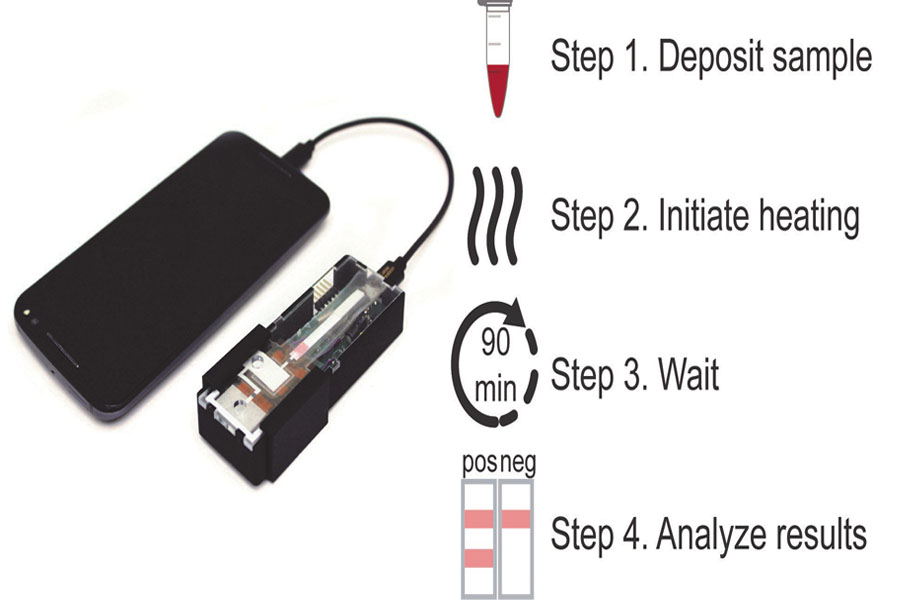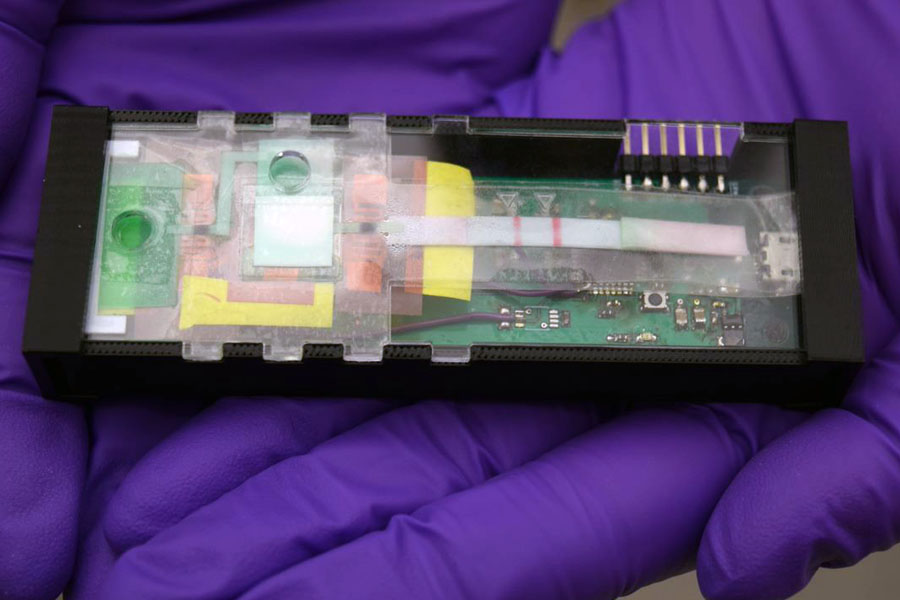BME‘s Linnes awarded Moore Inventor Fellowship
Jacqueline Linnes, PhD, the Marta E. Gross Assistant Professor in the Weldon School of Biomedical Engineering at Purdue University, was one of five researchers recently awarded the fellowship. She was named a Moore Inventor Fellow for her invention, the MicroRapid Autonomous Analytical Device (microRAAD). It combines highly sensitive nucleic acid amplification with the simplicity and scalability of low-cost paper-based devices. This approach enables accurate and accessible infection diagnosis for traditionally underserved communities.

Early and accurate diagnosis of infectious disease is critical to the delivery of timely and appropriate treatment that improves patient care, reduces the economic healthcare burden, and prevents disease transmission. However, access to gold standard detection of nucleic acids (DNA and RNA) is typically limited to high resource hospitals with extensive laboratory facilities. In order to bring these intricate analyses out of the lab and to the point of care, the implementation must balance robustness, ease of use, accuracy, and cost.
Linnes directs the Linnes Lab at Purdue University. She developed a new point-of-care concept in infection detection that meets these needs by integrating the simplicity and scalability of commonly used paper-based lateral flow immunoassays (LFIAs), such as pregnancy tests, with highly sensitive nucleic acid amplification.
“This fellowship will allow us to scale up our diagnostic device design and work directly with potential device users and manufacturers on the design for manufacturing and translation of the technology,” Linnes said.

MicroRAAD performed in a doctor’s office, pharmacy, or patient’s home will expedite the treatment response for newly infected individuals through early detection. This improvement in rapid diagnosis would enhance patient care and comfort by enabling expedited treatment before the disease advances. The high sensitivity and specificity of these easy-to-use nucleic acid tests would further reduce erroneous diagnoses.
“This is a huge honor to receive this award and I’m thrilled to join so many amazing Moore Inventor Fellows!” said Linnes.
Linnes’ work emphasizes the application of fundamental microfluidic principles and biological assays to develop point-of-care diagnostics for global health and wearable devices that enable health disparities research. Research in the lab focuses on advances in paper microfluidics, molecular biosensors, and human-centered instrumentation design to enable sensitive, robust, and rapid diagnostics for informed healthcare decision-making.
Her extensive experience in translational research includes co-founding and managing early-stage user feedback for three small companies, and leading user-response assessments with Engineers Without Borders. She co-developed mobile diagnostics, wearable devices, airborne pathogen inactivation tools, and water purification technologies with users in the U.S., Nicaragua, Kenya, Zambia, and Haiti. She applies these experiences in her teaching of undergraduate design, graduate level instrumentation measurement and point-of-care diagnostics, and workshops around the world.
Prior to joining Purdue University as faculty, Linnes earned her PhD in Bioengineering with Dr. James Bryers as well as a Graduate Certificate in Global Health at the University of Washington. She was a Fogarty Engineering Fellow in a collaboration between Brigham and Women’s Hospital and worked with Dr. Edward Nardell and the Massachusetts Institute of Technology with Jose Gomez-Marquez, before continuing her postdoctoral training in point-of-care diagnostics at Boston University in Dr. Catherine Klapperich’s lab. Previously, she earned her BS in Interdisciplinary Engineering at Purdue University. Besides the 2020 Moore Inventor Fellow award, she has also won: NIH Avenir Awards for HIV/AIDS Research (2020); Vodafone Foundation Wireless Innovation Project Award (2017); NIH National Research Service Award; Postdoctoral Fellowship (2014); and NSF Graduate Research Fellowship (2006).
Moore Fellowship
Launched in 2016 to celebrate the 50th anniversary of Moore’s Law, the revolutionary prediction that anticipated the exponential growth of computing power, the Moore Inventor Fellowship embraces the spirit of Gordon Moore’s passion for science and penchant for inventing. It supports scientist-inventors who create new tools and technologies with a high potential to accelerate progress in the foundation’s areas of interest: scientific discovery, environmental conservation and patient care.
References: 1Phillips et al., Lab on a Chip 2016, 2Byers et al., Analyst 2019, 3US20190126270A, 4WO2017184665A1, 5Phillips and Moehling et al.. Lab on a Chip 2019, 6Phillips et al., An Chem 2018
Source: Jacqueline Linnes, jlinnes@purdue.edu; and the Gordon and Betty Moore Foundation ("Gordon and Betty Moore Foundation announces 2020 Moore Inventor Fellows")
Writer: DeEtte Starr, starrd@purdue.edu
